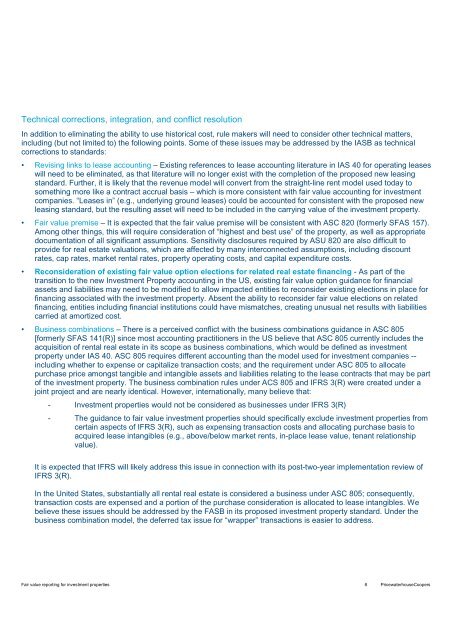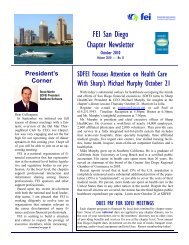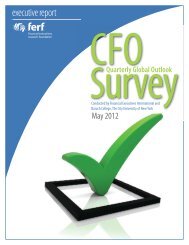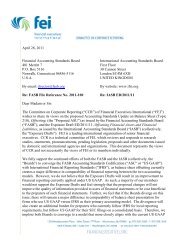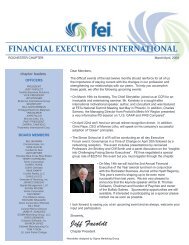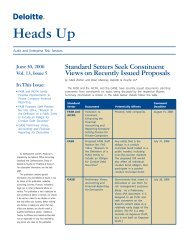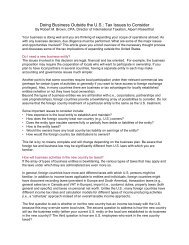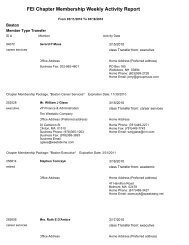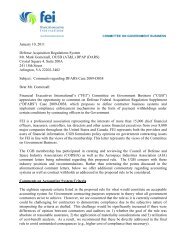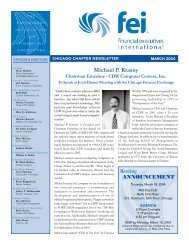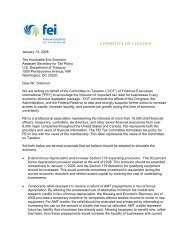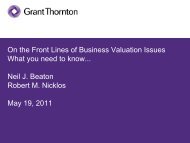Fair value reporting for investment properties under US GAAP
Fair value reporting for investment properties under US GAAP
Fair value reporting for investment properties under US GAAP
Create successful ePaper yourself
Turn your PDF publications into a flip-book with our unique Google optimized e-Paper software.
Technical corrections, integration, and conflict resolution<br />
In addition to eliminating the ability to use historical cost, rule makers will need to consider other technical matters,<br />
including (but not limited to) the following points. Some of these issues may be addressed by the IASB as technical<br />
corrections to standards:<br />
• Revising links to lease accounting – Existing references to lease accounting literature in IAS 40 <strong>for</strong> operating leases<br />
will need to be eliminated, as that literature will no longer exist with the completion of the proposed new leasing<br />
standard. Further, it is likely that the revenue model will convert from the straight-line rent model used today to<br />
something more like a contract accrual basis – which is more consistent with fair <strong>value</strong> accounting <strong>for</strong> <strong>investment</strong><br />
companies. “Leases in” (e.g., <strong>under</strong>lying ground leases) could be accounted <strong>for</strong> consistent with the proposed new<br />
leasing standard, but the resulting asset will need to be included in the carrying <strong>value</strong> of the <strong>investment</strong> property.<br />
• <strong>Fair</strong> <strong>value</strong> premise – It is expected that the fair <strong>value</strong> premise will be consistent with ASC 820 (<strong>for</strong>merly SFAS 157).<br />
Among other things, this will require consideration of “highest and best use” of the property, as well as appropriate<br />
documentation of all significant assumptions. Sensitivity disclosures required by ASU 820 are also difficult to<br />
provide <strong>for</strong> real estate valuations, which are affected by many interconnected assumptions, including discount<br />
rates, cap rates, market rental rates, property operating costs, and capital expenditure costs.<br />
• Reconsideration of existing fair <strong>value</strong> option elections <strong>for</strong> related real estate financing - As part of the<br />
transition to the new Investment Property accounting in the <strong>US</strong>, existing fair <strong>value</strong> option guidance <strong>for</strong> financial<br />
assets and liabilities may need to be modified to allow impacted entities to reconsider existing elections in place <strong>for</strong><br />
financing associated with the <strong>investment</strong> property. Absent the ability to reconsider fair <strong>value</strong> elections on related<br />
financing, entities including financial institutions could have mismatches, creating unusual net results with liabilities<br />
carried at amortized cost.<br />
• Business combinations – There is a perceived conflict with the business combinations guidance in ASC 805<br />
[<strong>for</strong>merly SFAS 141(R)] since most accounting practitioners in the <strong>US</strong> believe that ASC 805 currently includes the<br />
acquisition of rental real estate in its scope as business combinations, which would be defined as <strong>investment</strong><br />
property <strong>under</strong> IAS 40. ASC 805 requires different accounting than the model used <strong>for</strong> <strong>investment</strong> companies -including<br />
whether to expense or capitalize transaction costs; and the requirement <strong>under</strong> ASC 805 to allocate<br />
purchase price amongst tangible and intangible assets and liabilities relating to the lease contracts that may be part<br />
of the <strong>investment</strong> property. The business combination rules <strong>under</strong> ACS 805 and IFRS 3(R) were created <strong>under</strong> a<br />
joint project and are nearly identical. However, internationally, many believe that:<br />
- Investment <strong>properties</strong> would not be considered as businesses <strong>under</strong> IFRS 3(R)<br />
- The guidance to fair <strong>value</strong> <strong>investment</strong> <strong>properties</strong> should specifically exclude <strong>investment</strong> <strong>properties</strong> from<br />
certain aspects of IFRS 3(R), such as expensing transaction costs and allocating purchase basis to<br />
acquired lease intangibles (e.g., above/below market rents, in-place lease <strong>value</strong>, tenant relationship<br />
<strong>value</strong>).<br />
It is expected that IFRS will likely address this issue in connection with its post-two-year implementation review of<br />
IFRS 3(R).<br />
In the United States, substantially all rental real estate is considered a business <strong>under</strong> ASC 805; consequently,<br />
transaction costs are expensed and a portion of the purchase consideration is allocated to lease intangibles. We<br />
believe these issues should be addressed by the FASB in its proposed <strong>investment</strong> property standard. Under the<br />
business combination model, the deferred tax issue <strong>for</strong> “wrapper” transactions is easier to address.<br />
<strong>Fair</strong> <strong>value</strong> <strong>reporting</strong> <strong>for</strong> <strong>investment</strong> <strong>properties</strong> 8 PricewaterhouseCoopers


